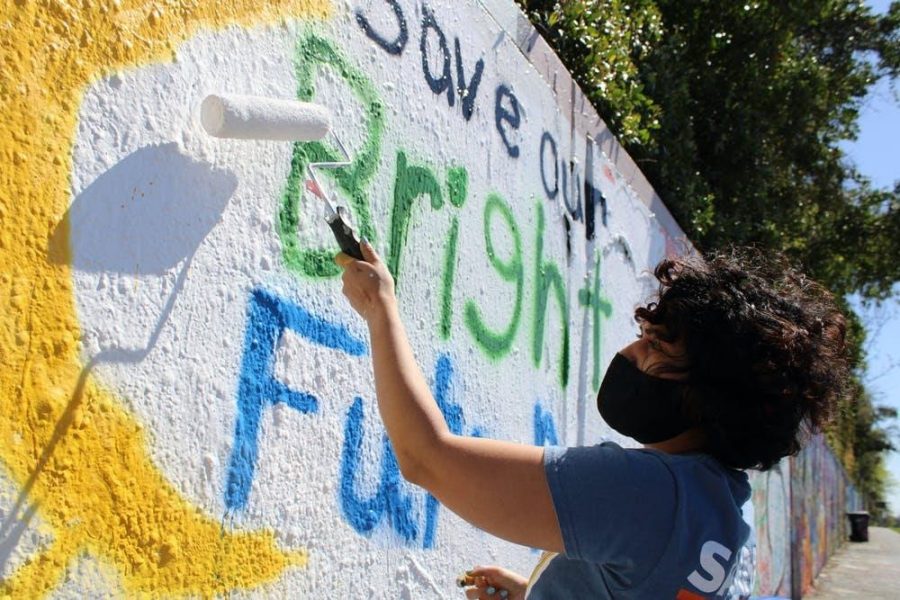Bright Futures Bill Limits Educational Freedoms
Alondra Arce, 20, a UF sustainability sophomore, paints a mural that says “Save Our Bright Futures” on Sunday, March 7, 2021. Arce recruited student volunteers to help her create the mural along 34th Street in Gainesville to raise awareness about Senate Bill 86, which would limit some students’ access to state funding for college if passed.
April 16, 2021
Senate Bill 86, which proposes limitations to the Bright Futures scholarship program, insults the freedoms Florida students have of pursuing higher education. The proposed legislation also enables unfair thinking from lawmakers and disproportionately affects lower-income students. In short, it hurts Florida’s own.
As a current dual enrollment student preparing to pursue an education at a four-year institution, I partially rely on Bright Futures to fund the extreme expenses, like tuition costs. The Bright Futures scholarships offer many students, like me, financial stability without experiencing an enormous financial burden while pursuing an education.
Many Florida students, parents, and educators did not take the initial changes in S.B. 86 lightly. After facing widespread backlash, Sen. Dennis Baxley (R-Ocala), who proposed S.B. 86 on Feb. 23, removed many of the initial proposed changes to the scholarship program on Mar. 22. Changes included the “reduction of a Bright Futures or Benacquisto Scholarship award amount tied to student enrollment in a certificate or degree program on a list created by the state Board of Governors, State Board of Education or Independent Colleges and Universities of Florida; the reduction in the total number of credits in a Bright Futures award by the number of acceleration credits applied; the provision relating to graduate study for Bright Futures award recipients tied to the certificate and degree list.”
While lawmakers removed many of the concerning amendments, the amounts of the scholarship awards and the source of the scholarship funds will still change if S.B. 86 passes. Currently, Bright Futures students can either receive 75% or 100% of tuition covered at qualifying schools. If S.B. 86 passes, the Florida Legislature will determine award amounts based on the state budget in the annual appropriations process. The source of funding would completely change from the Florida Lottery to Florida’s general fund.
Lawmakers who supported the initial legislation argue the bill would help the economy. Sen. Baxley suggested a change to Bright Futures as a means of helping relieve the strain the pandemic has had on Florida’s economy. To some extent, Bright Futures students who do not complete their degrees are not fulfilling their scholarship awards, which lawmakers, like Sen. Baxley, consider wasteful and adds to Florida’s economic issues.
While some of the intentions behind S.B. 86 are good in addressing the impact COVID-19 has had on Florida’s economy, there are other methods of sustaining Florida’s economy instead of cutting scholarship funding to Florida students. Many students choose to remain in Florida due to Bright Futures, and it is the reason why Florida ranks high in the nation when it comes to higher education.
S.B. 86 would merely restrict the opportunities that Florida students have of pursuing their prospective fields and reduce the incentive to keep bright students in Florida. If lawmakers like Sen. Baxley are concerned for Florida’s economy, then passing S.B. 86 would only cause economic stagnation, as students would leave Florida to pursue an education in other states that do not limit financial aid.
If passed, the changes in S.B. 86 would go into effect on Jul. 1.




